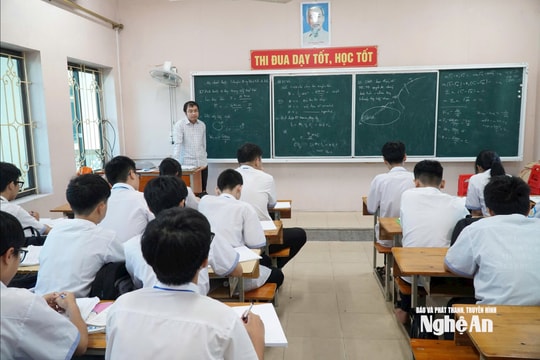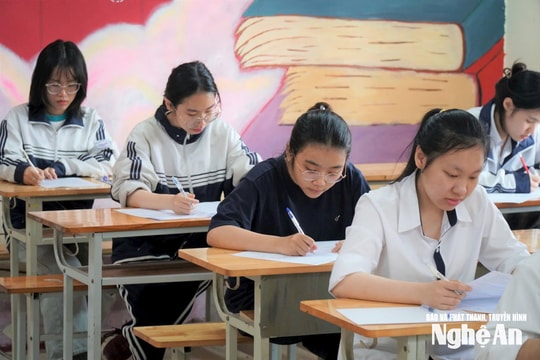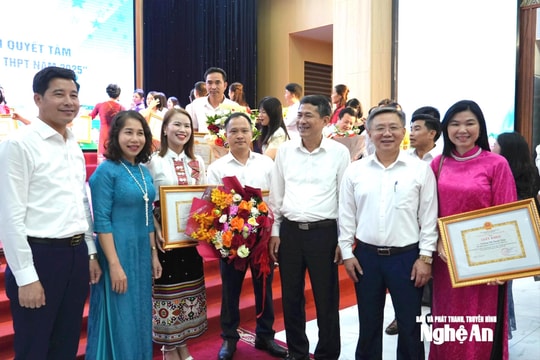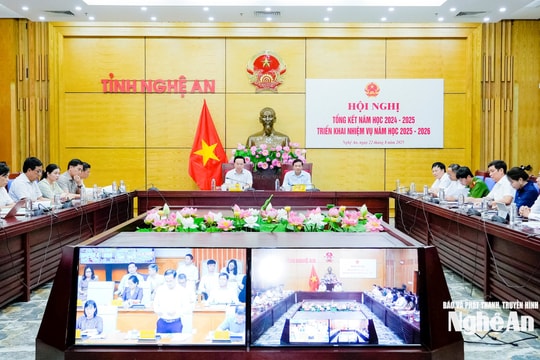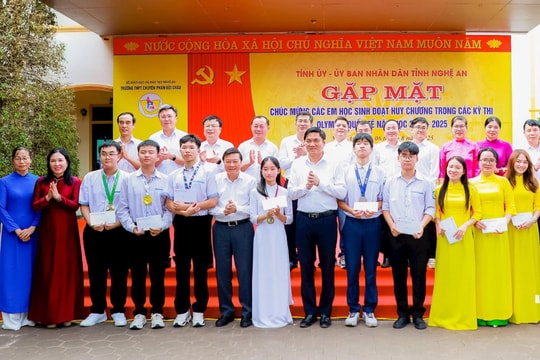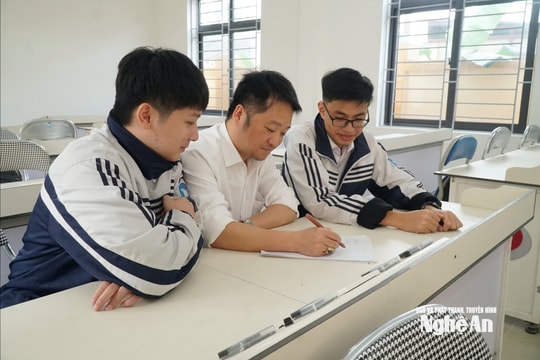Phan Boi Chau and the ideology of national solidarity in revolutionary struggle
(Baonghean.vn) - Phan Boi Chau (1867-1940) was one of the great patriots of the late 19th and early 20th centuries.
Phan Boi Chau was born on December 26, 1867 in Dan Nhiem village, Xuan Hoa commune, Nam Dan district, Nghe An province. He was one of the great patriots of the late 19th and early 20th centuries. Early on, he determined the strategic ideology of making a national democratic revolution, and proposed a policy of violence. Phan Boi Chau also saw the forces that could be gathered into the struggle against French colonialism. That was the ideology of national unity in the revolutionary struggle of the patriot.
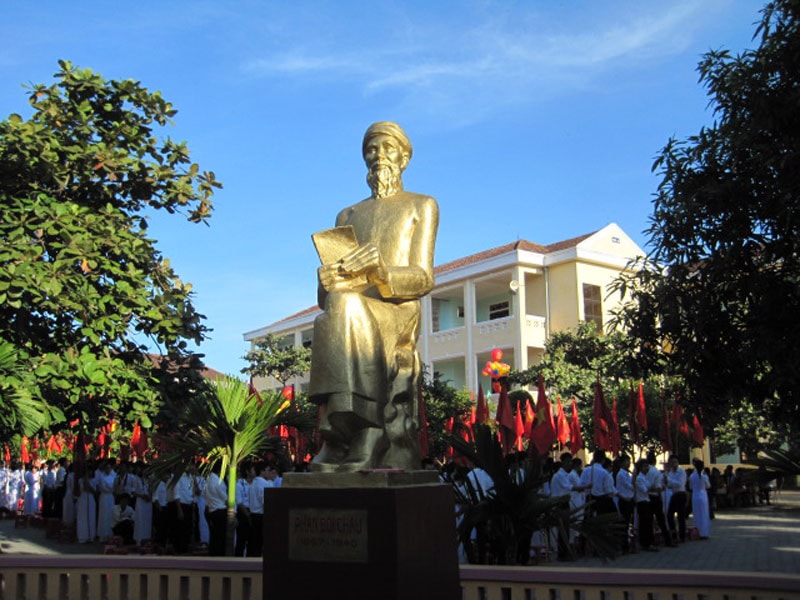 |
Statue of Phan Boi Chau placed at Phan Boi Chau High School for the Gifted. Photo courtesy |
The country fell into the hands of the French. The king and his mandarins became puppets. Suffering weighed heavily on the people's shoulders:
"Hundreds of taxes, all taxes are strict
Tighten like a thread
The market area in the countryside
"There is a way out, but there is no way back."
Therefore, he pointed out that the responsibility for liberating the country belonged to the people. Phan Boi Chau placed his hope on “fifty million people in the country”, all of whom were “children of the same family”, “uncles and brothers”, all of whom had the common property of the country left by their ancestors.
Patriotism means unity and unity is the only way to practice patriotism: “Since the country is a common country, we must unite our hearts and join our efforts to defend it.” Patriotism means keeping the country independent, and “independence comes from unity,” so we must unite. And he believed that our people “are all united in their desire to avenge their country.” Once the whole country is united, then:
"No matter how heavy the task is, if shared, it will be accomplished."
Join hands to pull the country back together.
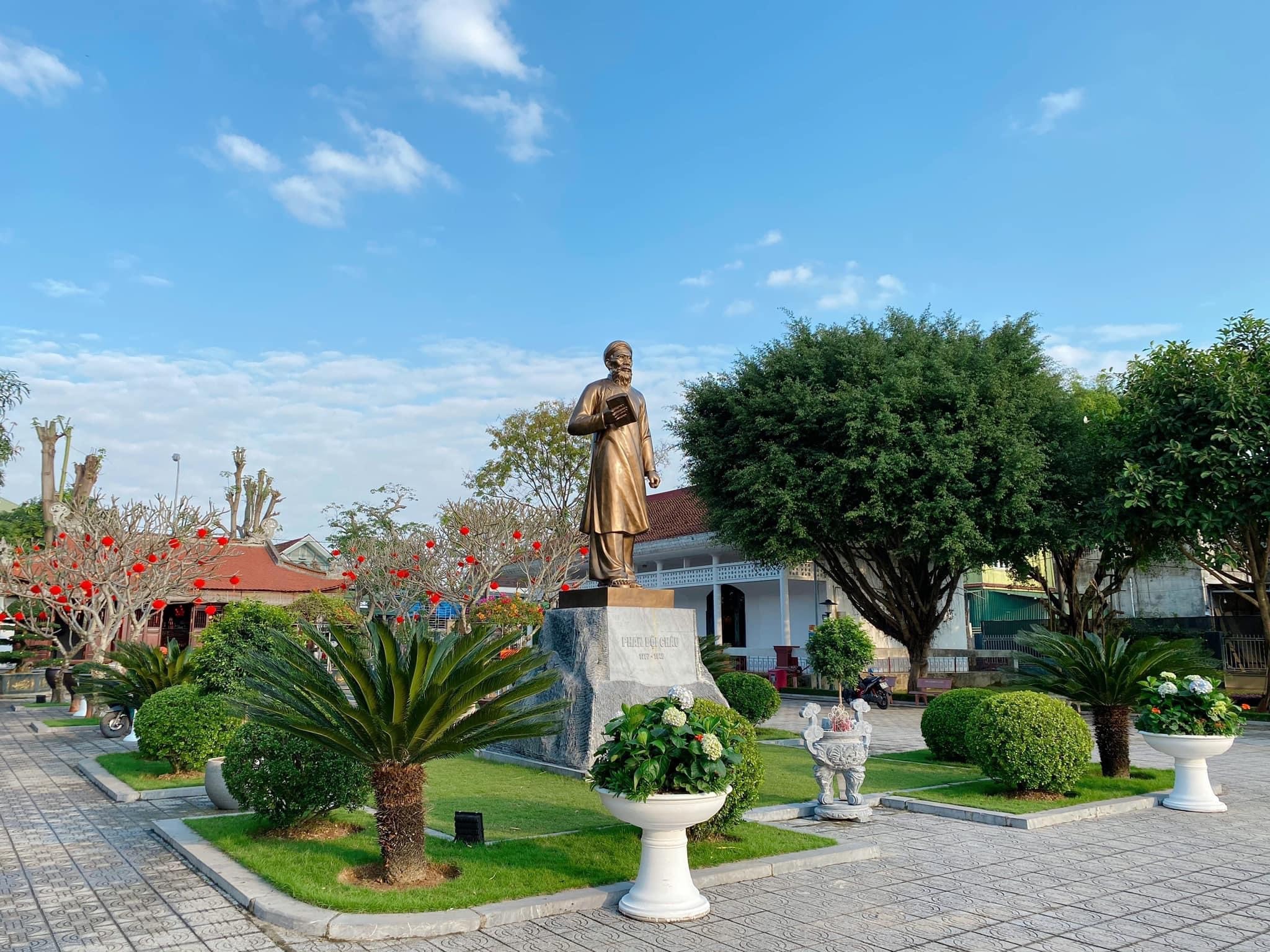 |
| The campus of the Phan Boi Chau Memorial Site in Nam Dan town, Nghe An province. Photo: Thanh Cuong |
Phan Boi Chau's perception of the role of the people over time has developed. In 1905, when writing "The History of Vietnam's Lost Nation", Phan Boi Chau divided the people in the country into five levels, all of whom were children of the same father and mother, of the same sky and lived on the same land, all of whom were compatriots in the same country and had the duty to revive the country. In the work "Overseas Blood Letter" (1906), he mentioned many types of people with the same mindset: rich people, mandarins, aristocrats, scholars, soldiers, religious followers, rebellious thugs, foolish children, kitchen servants, disciples, and people studying abroad. In each type of people, he analyzed their position and role in the cause of national liberation. Every class and every type of person was oppressed and persecuted. Therefore, everyone had the responsibility and ability to rise up to overthrow the colonialists.
"Fifty million dong of heart and soul compete"
Fifty thousand other varieties included!
Together, some less, some more
"The more sharp the sword, the louder the gun."
Phan Boi Chau saw the necessity and objective possibility of uniting all patriots regardless of class, religion, or party to stand up to save the country. What is special is that he saw the revolutionary potential of women, of soldiers, and of Catholics, something that many patriots of his time and before did not see. First of all, Phan Boi Chau had a very respectful view of women. Ever since he was a young man passionate about the ideal of saving the country, the Confucian scholar San had recognized the strength of women:
"Sisters carry the burden of the country
"Make clear the face of Vietnamese women".
When embarking on the path of national salvation, Phan Boi Chau increasingly recognized the role of women in the struggle for national liberation. He emphasized: “Women are those who have the responsibility to be good mothers, good wives, know how to do paperwork, good business, skillfully teach children, and help soldiers. A good mother will give birth to good children, a good wife will help a good husband. Moreover, in terms of political careers, women have endless rights. Only by focusing on education can we abandon our own privacy and pursue public interests, and make the country rich and strong and progress.” In his view on the issue of women, he had an extremely bold but very wise opinion: “If there are no patriotic women in the country, the country will have to be a servant to others.” Therefore, on his revolutionary path, there were many female comrades who were capable and very loyal to the revolutionary cause such as Ms. Lien, Ms. Trieu, Ms. Chi…
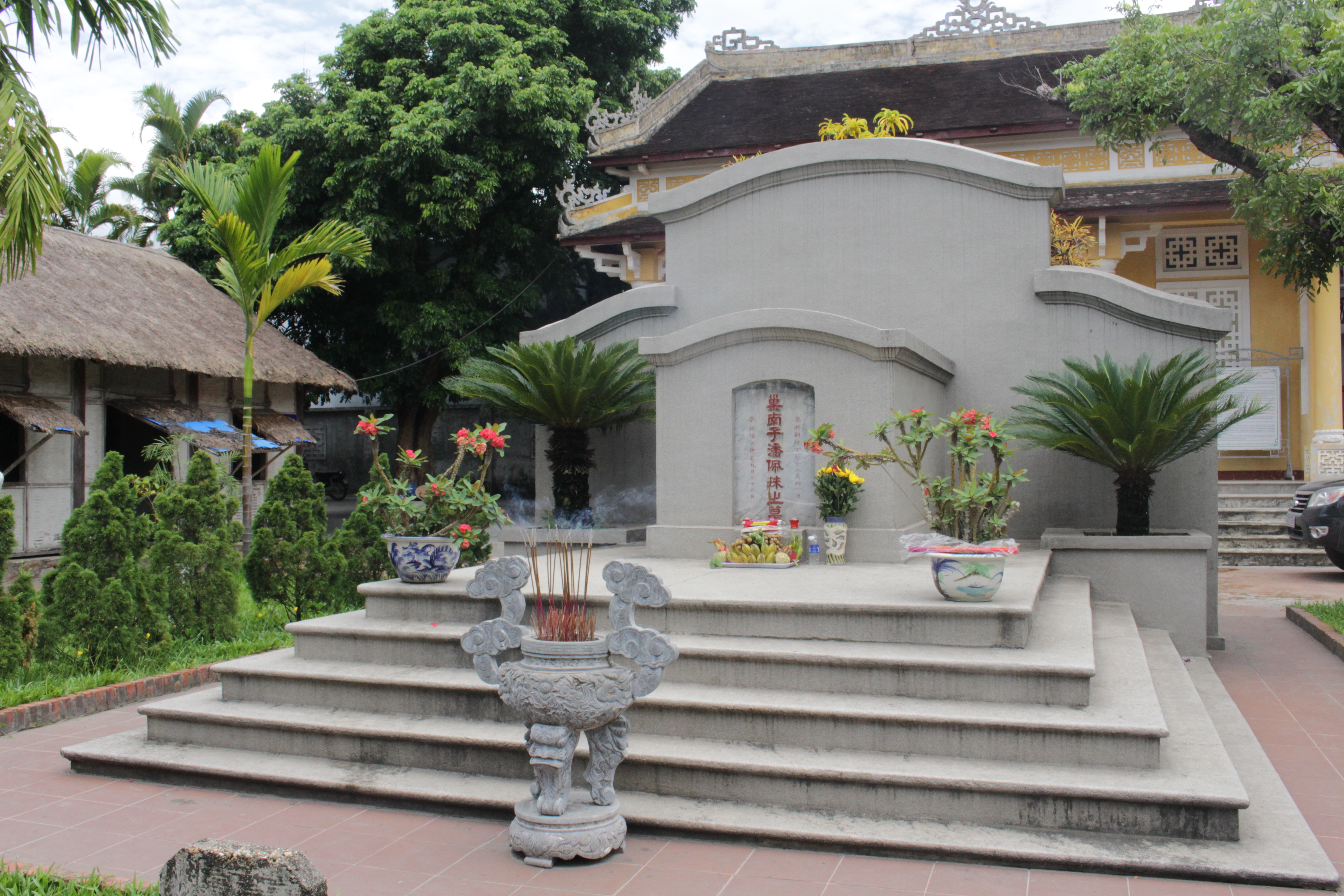 |
Phan's tomb is located at the Phan Boi Chau Memorial Site at 119 Phan Boi Chau Street, Truong An Ward, Hue City. Photo courtesy |
Regarding Catholic compatriots, Mr. Phan also realized that they all had a common hatred for the French invaders. The development of the Dong Du movement had a significant contribution from Catholic compatriots. Dozens of young Catholics followed Phan Boi Chau to Japan to study and then return to help the country, such as Luu Van Que, Ly Trong Mau, Ly Hong Chung, Le Khanh, Nguyen Van Phu, etc. Among them, Mai Lao Bang, also known as Mai Chau, was sent by the association to Japan as a representative of Catholic compatriots to participate in the Duy Tan Association and became a close comrade of Phan Boi Chau. Because of his deep understanding of the patriotism of Catholics, because of his ability to distinguish between friends and enemies correctly, Phan Boi Chau called for unity between Catholics and non-Catholics and believed in that unity: "The dark cloud that divided Catholics and non-Catholics has now been swept away, which is also a worthy thing."
As for the soldiers, he saw that they also followed the West because of misery to receive cheap salaries:
"Because of the money god, I have to step out.
No way I kill myself
It is also a root that grows out.
Therefore: "When your term expires, you will return, you will die from tax collection, your relatives will be left in ruins." The fate of soldiers returning to their villages was so tragic that Phan Boi Chau believed that he would be able to mobilize them: "Vietnamese soldiers will turn their guns on the French army" was an inevitable thing and one of the reasons for our nation's inevitable victory. And that belief was shown in the struggles of Vietnamese soldiers in the French army such as the Hanoi poisoning and the Thai Nguyen uprising.
In addition to the above-mentioned people, Phan Boi Chau also saw national unity in the mountainous and highland regions. He especially noted: “Those highland regions have dangerous terrain, rich natural resources, and the people here are brave in fighting. If we use them well, they will be ours, that will be the seed of our hegemony; if we ignore them, they will follow others and will be the grave that buries our country.” Such an observation is wise and progressive compared to the contemporary concept. And in his career of saving the country, there were many local tyrants and many ethnic minority people who followed him to make revolution. Later on, the revolutionary movement was also “nurtured” from the mountainous regions. In both the resistance wars against the French and the Americans, our “resistance capital” was also located in the mountainous regions and thanks to the protection of ethnic minorities. Phan Boi Chau was truly a person with strategic vision.
Phan Boi Chau's ardent patriotism was always open to the wind from all directions. He believed that anyone, any force, if they knew how to organize themselves into a disciplined organization, would promote the strength of the great national unity bloc to make revolution. National unity was a prominent idea in Phan Boi Chau's political system. Those were very precious things in a person, a patriotic scholar, who was concerned with the fate of the country all his life.
Although his national solidarity ideology still had some limitations due to the perspective of a Confucian scholar who had not yet escaped from his class category - which was also inevitable in the historical context at that time, Phan Boi Chau's national solidarity ideology was still a high development step compared to traditional ideology. Phan Boi Chau made the national solidarity ideology broad and democratic. That was his great contribution to the nation. Phan Boi Chau was the first politician interested in examining and evaluating each class of people in society to come to conclusions about their political attitudes. Phan Boi Chau's limitations were later overcome, perfected, supplemented with scientific theoretical basis by the Party of the Vietnamese working class and achieved victorious results in the cause of national liberation.

